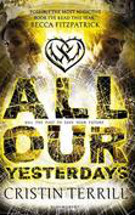All our yesterdays by Cristin Terrill

Bloomsbury, 2013. ISBN 978 14088 35197.
(Age: 15+) Em and Finn suffer terribly from their decision to travel
back in time to ensure the destruction of Cassandra, a device
originally designed to avert disaster and tragedy. Altering
the sequence of time and the resultant paradoxes which are produced
are thought provoking and compelling concepts to construct a story
around and this novel had great potential.
Described in split character narratives from the heroine's future
and past, the complex alternate realities are difficult to
comprehend at times, however this is a feature of the subject and
the challenge to the reader is reasonable. An interesting device is
used to distinguish the older Em from her younger self which enables
the reader to appreciate which aspect is speaking as the
complexities and sinister outcomes from Cassandra are revealed.
Clever character and plot developments are features of this story
which in its latter stages draws events and relationships together
in mind bending parallel histories. Explaining further runs the risk
of spoiling the story which hinges on a significant twist which,
whilst evident very early, maintains the framework until conclusion.
My criticism of this novel is that whilst the concept is
intelligent, the opening chapters are written as if the novel
was a later book in a series, relying on a reader's prior knowledge
of characters and events. This may be a device to prompt readers to
persist, in order to discover what the start was about. It is boldly
different to traditional chronological narratives and makes sense
when sequences are explained later, however some readers might
understandably abandon the novel in frustrated bewilderment.
Strong characters eventually bind this story which sadly loses
momentum with the excessive portrayal of teenage social
posturing. The characters are not always pleasant as they display
flaws and attitudes appropriate to the alternate realities of the
time shift. The precocious younger version of Em, a spoiled
brat with witless attitudes and juvenile romantic obsessions, later
shines as a brave young woman enduring cruelty and torment.
Torture scenes are skilfully implied, effectively conveying fear and
prompting revulsion without overt description. Violence is not
described excessively but swearing in keeping with the context
occurs on a couple of occasions and I would suggest this novel suits
15+.
Rob Welsh